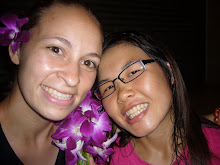Peterpan, P, and Pink have taught me a lot about Thai culture, but there's always more to learn.
Why is learning culture so important?
Ultimately so we can speak God's truth and show his love in a meaningful way. While many aspects of culture must be learned by experience, the following preface to Foreign to Familiar paints a good picture of why learning culture is so important.
The Delta flight was leaving on time. Three of us were strapped in, one next to the other, each finding it easy to make small talk. As the plane lifted off, so did our burdens of office work. We were off to Glorietta, New Mexico, for a week-long conference, and our minds were filled with thoughts of mountains and crisp air and a break from the Atlanta downtown routine.
“So, Sarah,” my aisle-seat colleague said in that chatty manner of a tourist on vacation, “tell me what it was like growing up in Israel.”
Of all conversation openers, this was my least favorite. I’d been hearing it ever since moving to the States to begin my university studies. But, being in the middle seat, I couldn’t escape.
My desire was to respond, “No, you first. Tell me what it was like growing up in a ranch-style house in suburbia.” What was there to say? And who cares anyway?
But I did answer…well, sort of. “It was great,” was the extent of my glib answer.
“No, I mean it, really,” she insisted. “What is the culture like over there?”
By the window sat Aida from Lebanon. She’d been in the States eight years and was much more of an expert on Middle Eastern culture than I was. But, at the moment, Aida seemed to be fascinated by the window. So I took up the challenge.
“Well, I grew up in a variety of cultures. The Jewish and Arab cultures are vastly different.”
“How so?” she asked.
“In the Jewish culture, you say what you think. It’s direct, and you know where you stand with people.”
I glanced at her to see if she was still with me. She was, so I continued.
“The Arab culture, on the other hand, is much more indirect. It’s all about friendliness and politeness. If offered a cup of coffee, I say ‘No, thank you.’
“The host offers it again, and I decline again with something like: ‘No, no, don’t bother yourself.’ He might offer a third time, and I’d reply, “No, I really don’t want any coffee. Believe me.’
“Then my host serves the coffee, and I drink it.”
“You’ve got to be kidding!” she said, incredulously.
“No, really,” I assured her. “You’re supposed to refuse the first few times. It’s the polite thing to do.”
“Then, what if you really don’t want the coffee?” she asked.
“Well, then there are idioms you can use to say that you wouldn’t for any reason refuse their kind hospitality, and at some point in the future you’ll gladly join them in coffee, but at the moment you really can’t drink it.”
Now Aida got into the conversation. “Incredible! I didn’t know that!” she said, as our heads turned her way.
“Aida,” I replied, “what do you mean you didn’t know that? You’re Lebanese, for heaven’s sake.”
“Yes,” she said, “but I mean I didn’t know this was not normal. I’ve been in the United States eight years already and did not realize it was done differently here. That explains so much.
“I’ve been lonely since moving here, and now I know why. When people in the office would ask me if I wanted to go to lunch, I would say ‘no’ to be polite, fully expecting them to ask me again. When they didn’t and left without me, I thought they didn’t really want me along and had asked only out of politeness. In my culture, it would have been too forward to say ‘yes’ the first time.
“For this reason, I’ve had few American friends. After all these years, now I know why.”
Sarah A. Lanier



I like this Julia, thanks for posting. Praying for you and the team.
ReplyDeleteTim